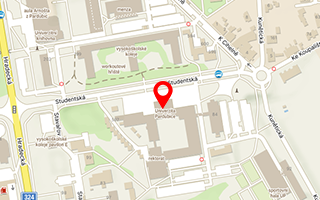Published: 21.07.2020
As a specialist on the coronavirus economic impact, macroeconomic development and financial literary, Jiří Nožička of the Jan Perner Faculty of Transport believes that the pandemic will change our financial behaviour and that we will start paying attention not only to weather forecasts, but also to the economic ones. “It is really important to follow such forecasts. The fact is that some 20% of Czechs had no savings before the outbreak, “says Nožička.
How severe was the impact of the outbreak on Czech economy?
It is still difficult to say with precision how severe the impact was. It will very much depend on how well we manage to restart our economy. The government used the STOP button to deactivate the economy, but there is no PLAY button available. It will take more time for all the processes to get inter-connected again and to start working. One of the problems may be when a link in the pre-pandemic supply chain disappears e.g. due to insolvency. I believe that the support for the companies affected by the outbreak is not sufficient, which only exacerbates the risk that the companies will be weak and the economic relations will be impaired. Confidence is the key to everything, and what we can see in Czech economy at the moment is some degree of caution since you do not know which of your customers may become insolvent and you want to avoid becoming insolvent as a result of their insolvency. The government did nothing to enhance the confidence between businesses, e.g. by bringing liquidity.
Did other countries manage better?
Indeed, for example Germany, where the government has afforded effective protection to German businesses. The German government managed to keep the businesses competitive, and thus showed that it is willing to do anything to minimise the risk of economic relations impairment. This increased the confidence among German businesses. Thus, German companies may look for opportunities for expansion in regions where the governments failed to help. Moreover, in Germany the financial literacy is high, which is also reflected in the election results. The German government was one of few that had managed to reduce its indebtedness over the past years and make some savings, which makes it possible to stabilise the German economy now. The government did not waste money on populist spending, and all Germans will benefit from this approach now. The risk of losing one’s job is rather low in Germany and the lost tax revenues will also be low since the economy will be restarted quickly and in a stable way. They also publicly announce their expansion plans, which will have a positive effect on German capital flows.
What does this mean for the development of the Czech economy?
Only time will tell. For a long time, the Czech government has failed to support investments by Czech businesses. In fact, the government rather discouraged them. As a result, the investment volume had decreased over the past years. If you add to this the lack of effective support for the businesses affected by the outbreak, the mixture may be dangerous. On a positive note, the Czechs are creative and I believe that the economy will cope in one way or another. Having said that, I expect German businesses to increase their market shares to the detriment of the Czech ones.
Is there anything positive at all about this situation?
What I see to be positive is increased trust in economic forecasts. The forecasts did say over the past years that low investments may affect the whole economy, which is precisely what is happening now. People will also see the impact of populist measures adopted in the past years, when money was spent on non-essential goods, and will not be available now to mitigate the damage. We used up savings from the past in the times of an economic expansion, and people will realize it now.
Do you think this will change our behaviour?
I do not believe that the impact of the coronavirus outbreak on the Czech economy will be drastic. It could, however, reshuffle our values, and thus protect us in the future should a major crisis come. We may learn a lesson from Germany which teaches us that a responsible government may help the whole economy by reducing the debt and making reserves. And such an approach is beneficial for everyone, not like the populist handouts to specific groups of people.
Personally, what I see as the most positive thing about this strange situation is what people can do. Some managed to develop and produce nano filters on a large scale, others combined snorkels with filters or developed pulmonary ventilators; many people made face masks, disinfectants or helped their neighbours or people at risk. Those who have a 3D printer produce various types of protective equipment or parts of such equipment to respond to the virus. Many people took the extra step, used their creativity and thus helped independently and voluntarily without any need for coordination or organization. That is something the Czechs can be proud of.
How long will it take for the economy to recover?
In a few months’ time, the economy could be more or less back on the track. Having said that, it will take more than a year to achieve the pre-pandemic economic level. It will also be affected by the resurgence of the pandemic in the autumn, if it comes. If the government again deactivated the whole economy, it would be a major economic problem.
Is there anything that we can do as individuals to restart the economy?
The government and the banks play the main role since they have many options to influence the situation. In theory, local governments could also help the businesses with the restart, but their capacities are rather limited. Each of us may help to save the businesses that have been affected, but it should be line with financial literacy. If we can afford it, we can eat out more often, visit more sights or buy a trip in the Czech Republic through a travel agency. It all depends on how the lockdown affected the disposable income of the households and what options will be available to support the local businesses by increased consumption.
So it helps to switch to local producers?
There are economists who believe that the crisis will result in deglobalization, and we will buy more local produce, which would also be beneficial for the environment. Why are there more and more people who buy frozen bakery products prepared many months before and sometimes hundreds of kilometres away that need to include a huge amount of additives in a situation when your local baker prepares fresh bakery much friendlier to your health? Why do we accept a situation when fish caught in Scotland are tinned in China and then sold to consumers in Europe? It is precisely such flows that helped spread the coronavirus so fast around the globe. I am all in favour of international trade where it is reasonable and does not create an additional ecological burden.
Can vouchers like “Save your restaurant, save your shop” solve the situation?
If nothing else, it is a good way of emotional support. Naturally, it is not a solution that would solve the operation of those businesses. But it is a lovely form of support.
How about holidays spent in the Czech Republic? Can these help?
I believe they can, but no one can estimate how much the income of households decreased, which will affect their consumption preferences. It is, undoubtedly, a chance for Czech tourism businesses not only for now, but also for the future. A change in holiday habits may also help the environment.
In what way?
Travelling abroad leaves a substantial carbon footprint. Moreover, places with more tourists generate more waste and are a heavier burden for the environment, which has lower capacity of regeneration. If the current situation reduces the tourism burden in the areas with most tourists, the environment will get a chance to take a break. Even though it will involve economic losses in tourism. We are fast approaching a situation where maximizing profit can no longer be a priority, and we will need to introduce restrictions to protect the environment.
How should we fight with food increases that may occur?
In my opinion, food prices are affected by the weather rather than by the virus, which would have a significant impact if it occurred in the sewing or harvesting season. In other words, the food prices will be considerably affected by the harvest. It depends on the spring frosts, rainfall or drought. What I see as a major problem is the virus resurgence that could come at the time of autumn harvest. If the weather is good and there is sufficient workforce available for the harvest, I do not expect the food prices to go up rapidly. At the the moment we see the increases in the vegetable prices; that is because vegetable is imported and was supposed to be harvested at the time when the restrictions were introduced and goods flows were restricted. This is what caused the food prices to go up.
Is it possible to prepare for any resurgence of the virus? In economic terms or otherwise?
It is not possible to prepare within a few months’ time. Having said that, we should be cautions in our free time or during our summer holidays. I would think about debt consolidation or a review of mortgages. In any way, I would do my best to strengthen my any my family’s immunity to be ready for the autumn. That means having a high vitamin intake, eating food from our climatic zone and spending time outside. We should also do some exercise and sports. It is also advisable to reduce our BMI since obesity is a risk factor and makes the disease more severe.
What should people not forget in terms of their household economy?
They should not forget about their health. That holds for the economy too. The most important thing is to have a robust immune system. Now more than ever should people refrain from activities that are more stressful. It is also advisable to change your diet to make it more healthy. For example. it is a good idea to eat apples from nearby orchards. Such apples have not been affected by the price hikes, and at the same time we support local economy and the immune system. As long as we are fit, we will also fare well in economic terms.
Everybody knows that we should save for a rainy day. How much should we save?
We should have such savings that make it possible for us to cope without six monthly salaries at least. What I do not recommend at all, however, is keeping the savings in cash at home. A well-chosen savings account may be a good option.
What do surveys suggest about our savings?
Most surveys suggest that some 20% of households could not make any savings before the outbreak. In other words, four in five respondents said to have some savings. My personal research revealed the same figures.
What research did you do?
I wanted to see whether the respondents noticed that the economic growth in the Czech Republic slowed down and whether they adjusted their consumption accordingly.
Did they?
Those who have noticed the slowdown did indeed adjust their consumption. Unfortunately, 47% of them did not notice the slowdown even though it had been discussed for some time in all media. Such respondents could not adjust their consumption to respond to the change. If we do not follow what is going on around us, we automatically give up the possibility to respond to any changes in the environment.
TEXT: Zuzana Paulusová / PHOTO: Adrián Zeiner

